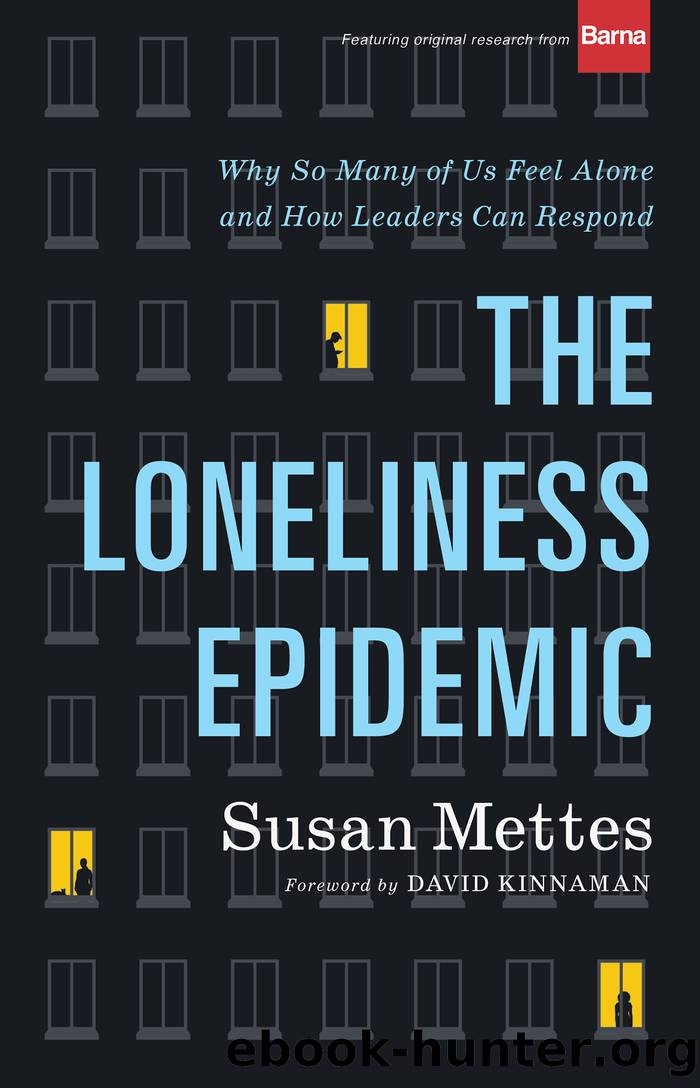The Loneliness Epidemic by Susan Mettes

Author:Susan Mettes
Language: eng
Format: epub
Tags: Christianity/Loneliness;Loneliness—Religious aspects—Christianity;REL108000;REL109000;REL012110
Publisher: Baker Publishing Group
Published: 2021-09-27T00:00:00+00:00
Trade-offs of Privacy
I wonder, though: Could the desire for privacy have dual outcomes? The first is straightforwardâthat people need privacy in order not to feel lonely. The second is a little more complicated. What if we have such an insatiable appetite for privacy that we end up ruling out satisfying relationships? Maybe our taste for privacy grows as our skills for avoiding loneliness decline.
More and more Americans had started living on their own by the early 2000s. The number of one-person households in the United States peaked right before the 2020 pandemic.4 When you live on your own, the homeâs level of cleanliness, its furniture arrangements, the way the towels are foldedâall of these things are your own choices. When you live with someone else, you have to learn to work with someone else to make those choices or to deal with the conflicts they bring up.
It is good to keep in form for sharing life with someone else. In The Four Loves, C. S. Lewis says, âOur model is the Jesus, not only of Calvary, but of the workshop, the roads, the crowds, the clamorous demands and surly oppositions, the lack of all peace and privacy, the interruptions.â5
This may sound very unappealing. Unselfishness often does. But itâs also important to remember that, as with exercise and moderation in eating, you receive a return on the kind of responsiveness that cuts into your privacy. Leaders working against loneliness will keep this in mind, for others and for themselves: those who follow Jesus must also be willing to be interrupted and to lack privacy.
Privacy, too, has trade-offs. We can thrive in it. Or our discipline and even our character can suffer. Without a little shame, we might fail to keep standards that help us. Who doesnât tidy their house at least partly to avoid shame when someone else comes in? And many of us eat more chips or dessert than is good for us in the absence of another. Studies have shownânot with complete consistencyâthat there is a âwatching eyes effect.â If weâre being âwatched,â even by a portrait on the wall or CCTV, we are more likely to do the right thing.6
The necessary balance of supervision and privacy, of being seen and invisibility, may vary across cultures and within a culture. But for all of us, privacy, when it goes too far, becomes social isolation. And for all of us, too little privacy can drive us a little crazy for lack of ability to process our thoughts in peace.
We need those watching eyes sometimes. They help us keep fit for a social life, including intimate relationships. But always being watched, paid attention to, or swept up in a crowd is no guarantee that weâll find the comfort and satisfaction we look for in relationships. We should start to examine our requirements for privacy more closely: What is our ideal? Is that ideal one that allows our lives to mesh with othersâ lives as intimacy requires?
Download
This site does not store any files on its server. We only index and link to content provided by other sites. Please contact the content providers to delete copyright contents if any and email us, we'll remove relevant links or contents immediately.
Machine Learning at Scale with H2O by Gregory Keys | David Whiting(4314)
Never by Ken Follett(3960)
Fairy Tale by Stephen King(3401)
Reminders of Him: A Novel by Colleen Hoover(3123)
The Man Who Died Twice by Richard Osman(3082)
Will by Will Smith(2924)
It Starts With Us (It Ends with Us #2) by Colleen Hoover(2370)
Rationality by Steven Pinker(2368)
Can't Hurt Me: Master Your Mind and Defy the Odds - Clean Edition by David Goggins(2344)
Friends, Lovers, and the Big Terrible Thing by Matthew Perry(2234)
The Becoming by Nora Roberts(2207)
The Stranger in the Lifeboat by Mitch Albom(2127)
Love on the Brain by Ali Hazelwood(2080)
New Morning Mercies: A Daily Gospel Devotional by Paul David Tripp(1920)
A Short History of War by Jeremy Black(1851)
The Strength In Our Scars by Bianca Sparacino(1847)
HBR's 10 Must Reads 2022 by Harvard Business Review(1847)
A Game of Thrones (The Illustrated Edition) by George R. R. Martin(1751)
Never Finished: Unshackle Your Mind and Win the War Within by David Goggins(1715)
